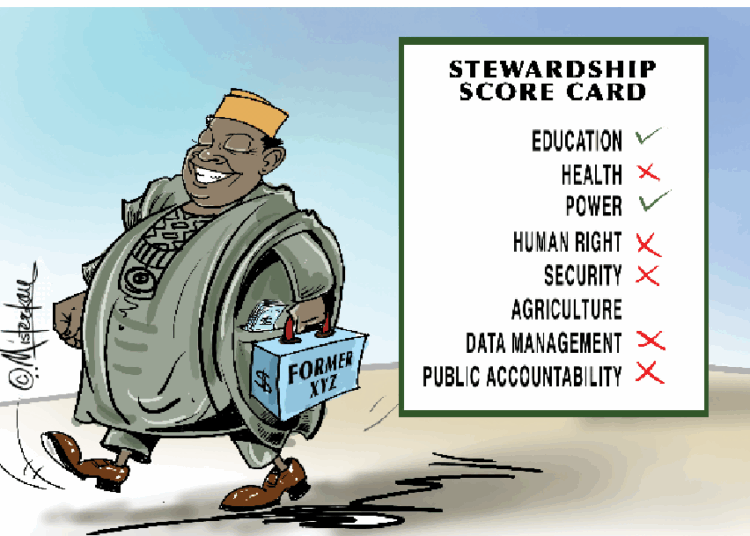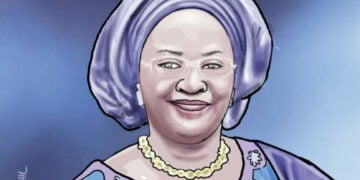There is a peculiar affliction that plagues the Nigerian political psyche: a persistent, almost ritualistic amnesia. It is not the natural forgetting that comes with the passage of time, nor is it the merciful letting go that fosters reconciliation. Rather, it is a calculated, convenient, and collective act of forgetting, an affliction that enables the whitewashing of legacies, the glorification of mediocrity, and the recycling of failed leaders under the guise of nostalgia, ethnic sentiment, religious affinity, or political expediency.
Nigeria’s democratic experiment is barely two and a half decades, old recycling the same set of public figures since independence. Former governors become senators; ex-ministers are reappointed to new ministries; failed presidential aspirants become party chairmen. It’s as though leadership is a rotating chair reserved for a select club of the politically connected.
What is striking is not just the recycling, but the public’s acceptance of it. A politician who looted state funds is welcomed back to the national stage with chants and drumming. A former military ruler who annulled democratic elections, committed gross human rights abuses and destroyed the economy is repackaged as a democrat. A governor who left civil servants unpaid and hospitals in ruins is hailed as a visionary for commissioning roads lined with billboards of his face.
This cycle is enabled by a public that either forgets too quickly or chooses not to remember at all. Where are the citizens who demanded justice when those politicians first erred? Where is the outrage when the same figures return to power under new party banners and slogans? Too often, it disappears in the fog of forgetfulness and the warmth of identity politics.
Ethnic, Religious and Posthumous Redemption
Few things are as predictable in Nigerian public life as the sainthood that often follows a leader’s death. Once a public figure dies, the floodgates of eulogies open. Media houses run documentaries. Politicians fall over themselves to issue glowing tributes. Civic organisations hold candlelight vigils. And most tellingly, the sins of the past are quickly scrubbed away from public memory.
Politicians of various stripes who have left office in controversial circumstances, either through impeachment, electoral loss, public rejection or tenure end, are often rebranded as elder statesmen within a decade. They are invited to national conferences, celebrated on their birthdays, and consulted as voices of wisdom. The same citizens who once protested their leadership failures now share their quotes on social media. This phenomenon is not about individual redemption; it is a symptom of a society that refuses to confront its political traumas honestly.
The selective amnesia that characterises public stewardship in Nigeria is often filtered through ethnic and religious lenses. Once a leader aligns with the ethnic or religious identity of a particular group, accountability becomes optional. A governor who underperforms in office may be celebrated simply because he is “our son.” A senator who fails to deliver meaningful legislation may still be rewarded with votes if he is seen as protecting the interests of “our people.” Worse still, any criticism of such individuals is quickly labelled as an attack on their ethnic group or faith.
This ethnic and religious shielding of public figures creates a dangerous feedback loop. Leaders quickly realise that competence is negotiable, but identity is non-negotiable. They play to the gallery, fan tribal sentiments, and weaponise religious affiliations to deflect criticism. In this climate, public service becomes less about delivering results and more about managing perceptions.
The Burden of Historical Honesty
We cannot build a nation on false memories. If Nigeria is to truly develop, it must confront its past with unflinching honesty. This includes not just remembering the misdeeds of public servants but documenting them, teaching them, and ensuring they are part of our civic consciousness.
Public institutions must play a leading role in this memory-keeping. The National Orientation Agency, for example, should be more than a ceremonial organ. It should curate a national archive of governance, one that tracks the records of public officials, celebrates excellence, and highlights failure without bias. Our schools must teach civic education that includes honest assessments of past leadership, not sanitised versions that serve political ends.
The media also bears a heavy responsibility. Too often, coverage of politicians is shaped by access, patronage, and advertising revenue. A media house that once exposed the corruption of a governor may later endorse him when he runs for higher office. This betrayal of journalistic integrity contributes to the collective forgetting. Memory must be defended, not erased or monetised.
Ultimately, the responsibility to remember rests with the people. Every citizen is a custodian of the nation’s political memory. Our votes are not just endorsements of manifestos; they are judgments on past performance. To vote for a failed leader simply because they share one’s ethnic, religious or political identity is to betray the future.
Memory is a political act. It is how societies signal what they value and what they reject. When Nigerians gather to mourn leaders who failed them, when they sing the praises of those who looted their wealth, when they forget to hold accountable those who turned public office into personal enterprise, they send a dangerous message: that there are no consequences for bad leadership.
But it doesn’t have to be this way. Around the world, citizens have used collective memory to demand change. In South Korea, civic activism led to the impeachment of a sitting president. In South Africa, public pressure forced the resignation of a leader accused of corruption. These were not spontaneous events; they were the result of societies that chose to remember.
The Right To Remember
We must begin to cultivate a culture of remembrance in Nigeria—one that values truth over sentiment, accountability over identity. This means refusing to celebrate politicians who failed us, regardless of how charming they are in retirement. It means challenging attempts to rewrite history in ways that absolve the guilty. It means insisting that public office is not a retirement home for failed politicians, but a place of serious responsibility.
One way to institutionalise this is through a National Public Accountability Scorecard—an independent, citizen-led index that tracks the performance of elected and appointed officials over time. Such a scorecard could be published annually, taught in schools, and used as a resource for future elections. It would serve as a permanent reminder that history is watching.
We must also create spaces, both physical and digital, where memory is preserved. Civic museums, oral history projects, documentary archives, and storytelling platforms can all serve as repositories of political memory. Let the people remember the stories of marginalised communities, of policy failures and successes, of public outrage and civic resistance. Memory must not die in the hands of the powerful.
Selective amnesia is not just a personal flaw; it is a national threat. When we forget the failures of our leaders, we invite them to fail us again. When we erase the past to soothe the present, we mortgage the future. In a country like Nigeria, where leadership is both powerful and consequential, memory is more than a tool; it is a weapon for justice.
Let us remember not to dwell in bitterness, but to hold power accountable; not to divide, but to demand better; not for the dead, but for the living and the unborn. Because nations do not collapse from too much memory, they collapse from too little.




